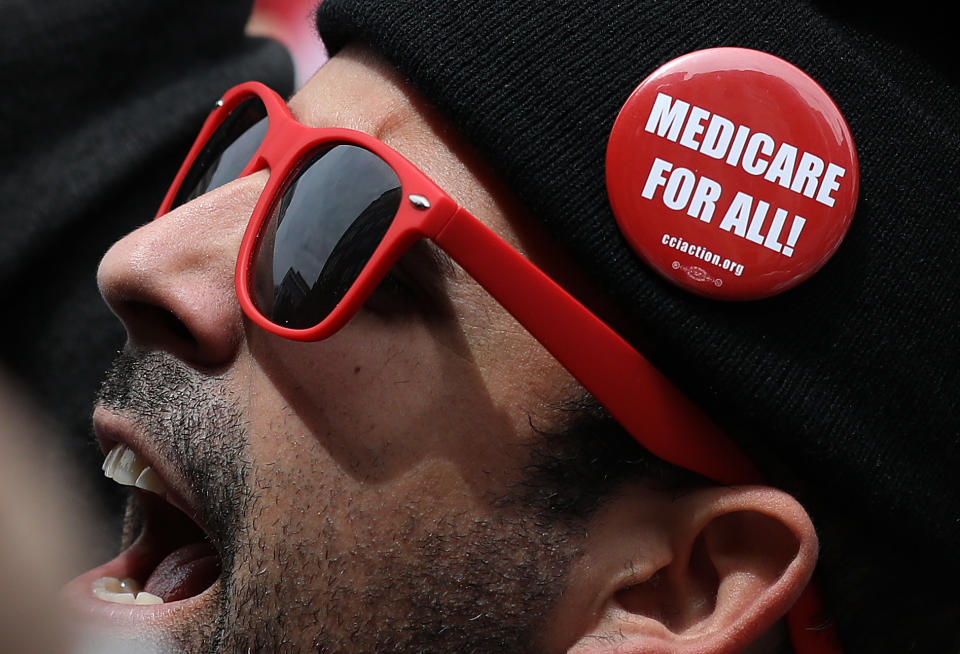Experts disagree whether Warren’s health care plan is ‘magical math’ or 'the biggest middle class tax cut ever'
Presidential candidate Elizabeth Warren (D-MA) recently unveiled her Medicare for All plan that would cost $20.5 trillion in federal spending over a decade.
During the presidential debate on Wednesday night, Warren explained how her plan would work.
“Let’s bring in as many people in and get as much help to the American people as we can as fast as we can,” she said. “On day one as president, I will bring down the cost of prescription drugs on things like insulin and EpiPens. That’s going to save tens of millions, hundreds of millions of dollars for people. I’m going to defend the Affordable Care Act from the sabotage of the Trump administration.”
Warren stated that within her first 100 days in office, she wants to bring in 135 million people into her Medicare for All at no cost.
“And then in the third year, when people have had a chance to feel it and taste it and live with it, we’re going to vote and we’re going to want Medicare for All,” she said.

A large portion of the funding for this health care plan comes from her proposed wealth tax, which would impose an annual tax of 2% on every dollar a household has above $50 million, which increases to 6% for households with more than $1 billion.
However, according to some experts, the plan doesn’t quite add up with reality.
“There’s definitely a lot of magical math in the plan,” Jim Kessler, executive president for center-left think tank Third Way, told Yahoo Finance. “There are some unbelievably rosy scenarios. And there are some revenue raisers that are generous to the point of being unrealistic. And other things in the plan that just would never happen.”
Warren isn’t the only candidate with a plan for Medicare for All. Senator Bernie Sanders’ (I-VT) plan would cost an estimated $33 trillion over 10 years, though his team argues that the changes would actually save money over time. Senator Kamala Harris (D-CA) released a Medicare for All plan that would give Americans the option to either purchase Medicare plans from private companies or buy government-administrated Medicare plans. Another Democratic candidate, South Bend Mayor Pete Buttigieg, distanced himself from Medicare for All. And former Vice President Joe Biden’s plan has been dubbed Obamacare 2.0.

‘This plan — it’s not achievable’
Warren’s ultra-millionaire tax is only one part of the funding for her plan. She also wants to place a 0.1% tax on 1% on the sales of bonds, stocks, or derivatives, which she claims would raise $800 billion in revenue over the next decade and “would likely have little to no effect on most investors.”
Additionally, Warren wants a country-by-country minimum tax on foreign earnings of 35% and a taxation of foreign firms, which she states would raise $1.65 trillion in revenue. Other sources of revenue include reforming the defense budget, big bank fees, and increasing take-home pay for workers.
“This plan — it’s not achievable,” Kessler said. “It’s a campaign and people are allowed poetic license on their policies. You don’t have to have every I dotted and every T crossed, that’s for sure. That’s where governing comes in. But when you have a policy of this size, you need to come closer to reality. The cost estimates that she has are not really in the ballpark of what other estimates are out there. And the taxes that she’s raising, some of them are unrealistic and some of them don’t get the money that she says it should get.”

One of Kessler’s main issues is the amount of money in the reimbursements for care going towards hospitals and doctors. The expert letter on the cost estimate of Medicare for All states: “Your proposal to set physician payment rates equal to Medicare rates under current law puts little if any pressure on aggregate physician incomes and physician practice spending. ... For individual physician practices, the net impact will depend importantly on specialty and payer mix. In particular, Medicare rates are lower than current private insurance rates but higher than the rates paid by Medicaid and the Children’s Health Insurance Program, which cover 72 million individuals.”
He added that the medical provider reimbursements are “unrealistically low. You would have the entire medical community marching the streets like it was a strike in Paris. This is the problem with Medicare for All: It is an incredibly ambitious policy that would come close to doubling the size of the federal government, and the idea that we could finance this through taxing wealthy people and corporations is just not possible.”
‘The biggest middle class tax cut ever’
According to the U.S. Census Bureau, the uninsured rate increased from 2017 to 2018 — the first year-to-year increase in the uninsured percentage since 2008 to 2009. In 2017, 25.6 million people were uninsured and that number increased to 27.4 million people in 2018, a 0.5% increase. Under Warren’s plan, there would be no uninsured.

“This proposal would achieve true universal coverage, and I think that is, from my perspective, an objective that policymakers should absolutely be aiming for,” Matthew Fiedler, a fellow at the USC-Brookings Schaeffer Initiative for Health Policy, told Yahoo Finance. “And that’s worth committing substantial federal resources in order to achieve.”
Simon Johnson, former chief economist at the IMF and one of the independent experts who assessed Warren’s plan, described the proposal as “absolutely” economically feasible.
“We think it’s not just feasible — we think it’s beneficial,” he told Yahoo Finance. “Because you’re improving health care for millions of Americans, including people who have insurance right now but they have crappy insurance because it has huge deductibles, or it doesn’t cover what they really need, and they only find that out too late, and they’re hit with surprise medical bills and a lot of other problems.”
He continued: “In addition — and I think not many people have picked up on this but I think it’s salient and important to the plan — is under current law, over the next 10 years, households are going to pay $11 trillion out of that $52 trillion out of our own pockets in health care premiums, co pays, deductibles, and so on. Under the Warren plan, that $11 trillion goes to zero. It’s effectively, or equivalent to the biggest middle class tax cut ever.”
Kessler, on the other hand, does not see it as a tax cut.
“The employer contribution is a tax on the middle class through the workplace,” he said. “More importantly, her financing plan uses cost estimates and revenue raisers that are so implausible that it’s hard to take her promise and the package seriously.”

Through Warren’s plan, employer contributions would continue through the form of Medicare contributions but would “pay less than they would have otherwise.”
“Whether you want to call it a tax or a premium or a contribution, her plan makes clear that the middle class is going to have to pay for some of the cost of Medicare for All,” Marc Goldwein, senior policy director for the Committee for a Responsible Federal Budget, told Yahoo Finance.
“The Medicare for All under Warren’s plan obviously expands the coverage and it improves the kind of coverage available, also for people on Medicare,” Johnson said. “It also comes with some cost efficiencies, because now you have a single-payer. And the point of having a single-payer, the biggest single point is that you can control costs and make the system more efficient because non-elderly care in the U.S. right now is very inefficient.”
Johnson said that skeptics are “completely wrong,” arguing that under the Warren plan, “every single employer is guaranteed to pay less so whatever you think the impact on wage is, under current law the impact is less under the Warren law.”
He continued: “If people don’t understand the impact of this on their lives, they should look at their pay stub and look at the number that says employee contribution to employer-sponsored insurance and that number goes to zero. You have access to health care that is better than what you’re currently getting because there’s no deductibles, no co-pays, and the choice that you can have under Medicare currently and under Medicare for All projected is better than any private insurance plan I’ve ever seen.”

‘Is it the largest middle class tax cut ever? My answer is yes’
Warren has described her approach to Medicare for All as “one of the greatest federal expansions of middle class wealth in our history,” boasting that it would put “$11 trillion in household expenses back in the pockets of American families.”
Johnson echoed that sentiment.
“There’s no issue of raising middle class taxes,” Johnson said. “The question would be is it the largest middle class tax cut ever? My answer is yes. These health insurance premiums are a terrible weight on people’s lives.”
A report from the Commonwealth Fund found that “employer plan premium contributions and out-of-pocket costs, like those for prescription drugs, are eating up an increasing portion of household budgets.”
An estimated 23.6 million Americans with employer coverage had high premium contributions, high out-of-pocket costs, or both, according to the report.
It is reasons like this why Medicare for All became a popular “bumper sticker” for 2020 presidential candidates, Kessler said.
“People are frustrated with the health care system,” he said. “There’s no doubt about it. We pay too much. Democrats are united that we want everyone to be covered, that health care is a right. So, there’s room for lots of big ideas out there but you’ve got to be realistic about the cost and realistic about the disruption.”
Adriana is an associate editor for Yahoo Finance. Follow her on Twitter @adrianambells.
READ MORE:
Economist: Medicare costs need to be brought 'under control' before expansion
'Everyone’s health insurance is more expensive' as more Americans manage chronic diseases
Read the latest financial and business news from Yahoo Finance
Follow Yahoo Finance on Twitter, Facebook, Instagram, Flipboard, SmartNews, LinkedIn, YouTube, and reddit.


